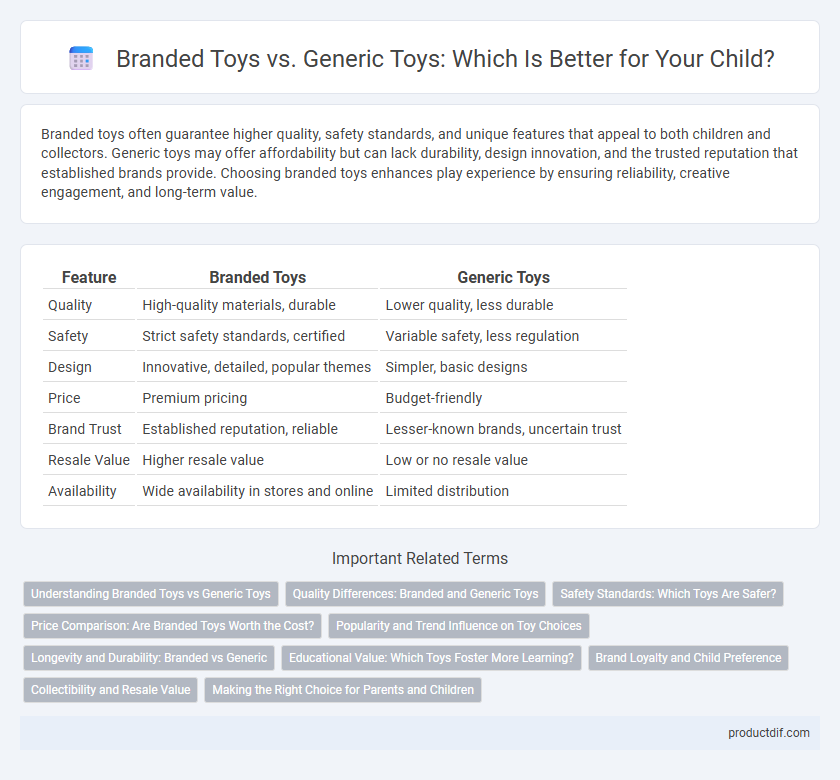Branded toys often guarantee higher quality, safety standards, and unique features that appeal to both children and collectors. Generic toys may offer affordability but can lack durability, design innovation, and the trusted reputation that established brands provide. Choosing branded toys enhances play experience by ensuring reliability, creative engagement, and long-term value.
Table of Comparison
| Feature | Branded Toys | Generic Toys |
|---|---|---|
| Quality | High-quality materials, durable | Lower quality, less durable |
| Safety | Strict safety standards, certified | Variable safety, less regulation |
| Design | Innovative, detailed, popular themes | Simpler, basic designs |
| Price | Premium pricing | Budget-friendly |
| Brand Trust | Established reputation, reliable | Lesser-known brands, uncertain trust |
| Resale Value | Higher resale value | Low or no resale value |
| Availability | Wide availability in stores and online | Limited distribution |
Understanding Branded Toys vs Generic Toys
Branded toys often guarantee higher quality, safety standards, and durability due to strict manufacturing regulations and established reputation in companies like LEGO, Mattel, and Hasbro. Generic toys, while typically more affordable, may vary widely in quality and safety, frequently lacking certification or consistent material standards. Consumers prioritize branded toys for trusted design, educational value, and long-term playability compared to the unpredictable performance of generic alternatives.
Quality Differences: Branded and Generic Toys
Branded toys often boast higher quality materials and rigorous safety standards compared to generic toys, which may use cheaper components and lack thorough testing. The durability and design precision of branded toys contribute to a safer and longer-lasting play experience. Consumers frequently choose branded toys for their reliable craftsmanship and compliance with international safety certifications like ASTM F963 and EN71.
Safety Standards: Which Toys Are Safer?
Branded toys typically adhere to strict safety standards and undergo rigorous testing certified by organizations such as ASTM International and the Consumer Product Safety Commission (CPSC), ensuring reduced risks of choking hazards, toxic materials, and sharp edges. In contrast, generic toys often lack consistent quality control and may not comply fully with regulatory safety requirements, increasing the likelihood of safety concerns. Parents and caregivers should prioritize toys with recognized safety certifications and clear labeling to guarantee a safer play environment for children.
Price Comparison: Are Branded Toys Worth the Cost?
Branded toys often carry higher price tags due to quality materials, safety certifications, and popular licensing agreements, whereas generic toys provide more budget-friendly options with varied quality standards. Studies show that while branded toys tend to have longer durability and better resale value, generic toys can offer similar play value at a fraction of the cost. Evaluating factors such as safety, educational value, and brand reputation helps determine if the premium price of branded toys justifies the investment.
Popularity and Trend Influence on Toy Choices
Branded toys dominate the market due to strong popularity driven by media exposure, licensed characters, and established trust in quality and safety. Trend influence significantly sways toy choices, with children and parents alike gravitating toward popular franchises and trending themes promoted through marketing and social media. Generic toys, while often more affordable, struggle to match the trend appeal and cultural relevance that branded toys consistently maintain.
Longevity and Durability: Branded vs Generic
Branded toys often feature higher-quality materials and stringent manufacturing standards, resulting in superior longevity and durability compared to generic toys. These toys withstand rough play and last through multiple children, maintaining safety and functionality over time. Generic toys tend to wear out faster due to cheaper components, reducing their overall lifespan and increasing the need for replacements.
Educational Value: Which Toys Foster More Learning?
Branded toys often incorporate research-backed educational features that enhance cognitive, motor, and social skills in children, leveraging expert insights and developmental psychology principles. Generic toys may offer creative play opportunities but frequently lack targeted learning objectives and quality control, which can limit their educational effectiveness. Studies indicate that branded educational toys, such as those from LeapFrog or Melissa & Doug, consistently promote structured learning outcomes and skill development.
Brand Loyalty and Child Preference
Branded toys often foster strong brand loyalty among children due to consistent quality, recognizable characters, and targeted marketing, enhancing repeated purchase behavior. Children tend to prefer branded toys that align with popular media franchises, creating emotional connections that generic toys typically lack. Research indicates that brand loyalty in toys significantly influences gift decisions and long-term consumer relationships within the toy industry.
Collectibility and Resale Value
Branded toys, especially those linked to popular franchises like LEGO, Funko Pop, and Hot Wheels, consistently maintain higher collectibility and resale value due to their limited editions and official licensing. Generic toys often lack official branding and unique features, which significantly limits their appeal to collectors and diminishes long-term resale potential. Rarity, brand reputation, and condition are critical factors that make branded toys more desirable in secondary markets.
Making the Right Choice for Parents and Children
Branded toys offer proven safety standards, quality materials, and educational value, giving parents confidence in their purchases and children a stimulating play experience. Generic toys may be more affordable, but they often lack consistent durability, compliance with safety regulations, and engaging features that support child development. Choosing branded toys ensures a reliable balance of fun, safety, and learning benefits crucial for healthy growth and parental peace of mind.
branded toys vs generic toys Infographic

 productdif.com
productdif.com